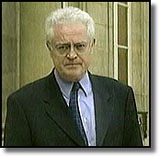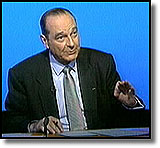
|
Jospin promises new policy for FranceThe new Prime Minister of France Lionel Jospin has promised a "new policy" for his country, and a new direction for Europe. Mr Jospin's Socialist Party won an overwhelming victory in Sunday's final round of voting, but they now need to form a coalition with their allies, the communist party, to secure an overall majority in government.The victory is an enormous triumph for Mr Jospin who did not even have a seat in Parliament before the election campaign. "The president of the republic offered to appoint me as prime minister. I accepted," Mr Jospin told reporters on the steps of the presidential palace after a 55-minute meeting with Mr Chirac. The centre-right coalition of the outgoing government lost almost half its seats, including those of seven ministers. Tony Blair was among the first world leaders to telephone French Socialist leader Lionel Jospin to congratulate him on his success. President Jacques Chirac spectacularly lost his gamble in calling the election ten months early. Mr Chirac was seeking a renewed mandate for the old centre-right government to carry out austerity measures, so France can join the new single European currency in 1999. But Mr Jospin has said he wants to reduce unemployment first. The Communists strongly oppose the new currency. Mr Jospin said French voters had demanded a change in policies towards Europe, and more attention paid to the problems of daily life. The outgoing Prime Minister, Alain Juppe, said that his government had failed to convince voters that it was in the right direction. The leader of the extreme right-wing National Front, Jean-Marie le Pen, said President Chirac suffered a personal defeat and should resign. The National Front achieved just one seat, but is said to have taken significant votes from the centre-right.
At the European Union in Brussels, officials said the result would not affect the planned introduction of the new single currency in 1999. The Socialists and their allies won 280 seats, the ecologists seven and the Communists 38. The ruling Centre-right coalition lost around half its seats. The Centre-right coalition of the Gaullist RPR and the centrist UDF lost almost half their seats, taking 257. Other right-wing candidates won 14 seats and the extreme-right National Front one.
TurnoutIn the first round, held a week ago, the rate of abstentions was over thirty per cent, and both the socialist opposition, and the ruling centre right have been urging apathetic voters to cast their votes. Both camps believed a high turnout would help their cause in what was expected to have been a very tight result. By late afternoon, turnout had reached 58%, some 3% higher than at the same time in last Sunday's first round poll.
Campaign IssuesThe situation for control of the French Parliament appeared finely balanced. The socialists were confident, the centre right believed it could win if it persuaded the disillusioned supporters who didn't turn out in last week's poll, to vote. The President, Jacques Chirac called the election a year earlier than necessary in the hope that he would get a mandate strong enough to take him through the difficult run up to the start of the single currency.
|
Diana, Princess of Wales, 1961-1997
Conference 97
Devolution
The Archive
News |
Issues |
Background |
Parties |
Analysis |
TV/Radio/Web
Interactive |
Forum |
Live |
About This Site
News |
Issues |
Background |
Parties |
Analysis |
TV/Radio/Web
Interactive |
Forum |
Live |
About This Site
© BBC 1997 |
politics97@bbc.co.uk |



